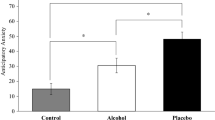Abstract
Based on the fear appeal literature, it was predicted that a fear-arousing message opposing alcohol abuse would be more effective when it attributed alcoholism to maladaptive learning than when alcoholism was attributed to an incurable disease, while with a low fear message these causal attributions might have opposite effects. While this prediction was supported for adaptive attitudes and intentions to reduce drinking, especially for heavy social drinkers, none of the experimental messages produced any reduction in actual daily drinking among either heavy or moderate drinkers, the two groups included in this experiment. It was also found that the high fear messages, and to a lesser extent the low fear messages, greatly reduced the normally positive correlation (observed in the control group) between intentions to reduce drinking and actual drinking reduction (throughout a 1-month follow-up period). The possibility that the fear messages may have undermined subjects' expectations about coping with the danger of alcoholism, and the practical implications of these findings are discussed.
Similar content being viewed by others
Reference Note
Armor, D. J., Polich, J. M., & Stambul,Alcoholism and treatment. A technical report by the Rand Corporation for a grant from the National Institute on Alcohol Abuse and Alcoholism, 1976.
References
Bandura, A.Principles of behavior modification. New York: Holt, Rinehart & Winston, 1969.
Bandura, A. Self-efficacy: Toward a unifying theory of behavior change.Psychological Review 1977,84 2.
Berkowitz, L., & Cottingham, D. R. The interest value and relevance of fear-arousing communications.Journal of Abnormal and Social Psychology 1960,60 37–43.
Bolles, R. C. Reinforcement, expectancy, and learning.Psychological Review 1972,79 394–409.
Brehm, J.Control and motivation. Invited address to the Western Psychological Association, Seattle, 1977.
Cahalan, D., & Cisin, I. H. Epidemiological and social factors associated with drinking problems. In Tarter & Sugerman (Eds.),Alcoholism: Interdisciplinary approaches to an enduring problem. Reading, Massachusetts: Addison-Wesley, 1976.
Cahalan, D., Cisin, I. H., & Crossley, H. M.American drinking practices (Monograph No. 6). New Brunswick, New Jersey: Rutgers Center of Alcohol Studies, 1969.
Chu, G. C. Fear arousal, efficacy, and imminency.Journal of Personality and Social Psychology 1966,4 517–524.
Dabbs, J. M., & Leventhal, H. Effects of varying the recommendations in a fear-arousing communication.Journal of Personality and Social Psychology 1966,4 525–531.
Fritzen, R. D., & Mazer, G. L. The effects of fear appeal and communication toward alcohol consumption.Journal of Drug Education, 1975,5(2).
Higgins, R. L., & Marlatt, G. A. Fear of interpersonal evaluation as a determinant of alcohol consumption in male social drinkers.Journal of Abnormal Psychology 1975,84 644–651.
Jellinek, K. M.The disease concept of alcoholism. New Haven: College and University Press, 1960.
Leventhal, H. Findings and theory in the study of fear communications. In L. Berkowitz (Ed.),Advances in experimental social psychology (Vol. 5). New York: Academic Press, 1970.
Leventhal, H., & Watts, J. C. Sources of resistance to fear-arousing communications on smoking and lung cancer.Journal of Personality 1966,34 155–175.
Leventhal, H., Watts, J. C., & Pagano, F. Effects of fear and instructions of how to cope with danger.Journal of Personality and Social Psychology 1967,6 313–322.
Maisto, S. A., Sobell, L. C., & Sobell, M. B. Comparison of alcoholics' self-report of drinking behavior with reports of collateral informants.Journal of Consulting and Clinical Psychology 1979,47(1), 106–112.
Marlatt, G. A. Alcohol, stress and cognitive control. In C. D. Speilberger & I. G. Sarason (Eds.),Stress and anxiety (Vol. 3). Hemisphere, 1976.
Niles, P.The relationships of susceptibility and anxiety to acceptance of fear-arousing communications. Unpublished doctoral dissertation, Yale University, 1964.
Rogers, R. W., Deckner, C. O., & Mewborn, C. R. An expectancy-value theory approach to the long-term modification of smoking behavior.Journal of Clinical Psychology 1978,34 562–566.
Rogers, R. W., & Mewborn, C. R. Fear appeals and attitude change: Effects of a threat's noxiousness, probability of occurrence, and the efficacy of coping responses.Journal of Personality and Social Psychology 1976,34 54–61.
Schlegel, R. P., Crawford, C. A., & Sanborn, M. D. Correspondence and mediational properties of the Fishbein model: An application to adolescent alcohol use.Journal of Experimental Social Psychology 1977,13 421–430.
Author information
Authors and Affiliations
Additional information
This research was supported by grant RO1 AA 02448-02 from the National Institute of Alcoholism and Alcohol Abuse to the first author and John P. Keating. The authors would like to express their thanks to Robert Croyle and Bruce Morasch for their help in conducting this research, and to Andrew Davidson and John P. Keating for their helpful comments on an earlier draft of this manuscript.
Rights and permissions
About this article
Cite this article
Steele, C.M., Southwick, L. Effects of fear and causal attribution about alcoholism on drinking and related attitudes among heavy and moderate social drinkers. Cogn Ther Res 5, 339–350 (1981). https://doi.org/10.1007/BF01173685
Issue Date:
DOI: https://doi.org/10.1007/BF01173685




